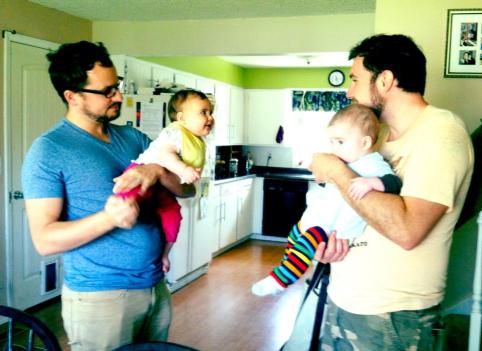Tagged: Lou Dobbs
Apparently I Am Destroying Civilization
A recent Pew Research analysis revealed that 40% of U.S. households now have a female breadwinner. As you can see, Lou Dobbs and Friends over at Fox News don’t take this news well:
At first, I felt a little offended by the clip. After all, I am a woman and the breadwinner of my family. But then I realized that they say absolutely nothing about me or my family situation at all. For them, there seem to be only two kinds of families: a nuclear family with a male breadwinner, which is inherently healthy and stable, and dysfunctional families with impoverished single mothers and absent fathers. (You should also watch Fox News anchor Megyn Kelly, of all people, take these guys to task on that point, in this epically awesome smackdown.)
The “analysis” of Dobbs and his buddies completely bypasses the salient point, clearly articulated in the PEW findings, that the “breadwinner moms” are made up of two very different groups: “5.1 million (37%) are married mothers who have a higher income than their husbands, and 8.6 million (63%) are single mothers.” The jumbled, fallacy-ridden exchange skates over that distinction straight into apocalypse land, where the family is disintegrating, children are endangered, and men (or at least their balls) are nowhere to be found. There is no room whatsoever in their discussion for a man who chooses to be underemployed or forego employment altogether to be more present at home, because their notion of familial health depends upon a narrow, capitalist conception of masculinity: a man is someone who takes care of his family by making money.
Such assumptions about masculinity are rife in the Fox News clip – men have a “natural” or God-given role to protect, provide, be dominant, etc., and that is interpreted in exclusively economic terms; the definition of the Protector/Provider has become synonymous with earning a paycheck outside the home. Yet these talking heads seem oblivious that what they are defending as the “natural state” of humankind (nuclear family + male breadwinner) is a relatively modern, post-industrial invention.
Their high-pitched anxiety is not about what women are doing, but what men aren’t doing. In the world of Lou Dobbs and Erick Erickson there seems to be no space for families or men who choose to “lean out” of the workplace and into the home, who resist the contemporary American myth of material wealth and happiness as correlative.
I’d like to add another talking man-head to the conversation — one perhaps worth listening to — who sees the domestic sphere radically different than Dobbs et al: Wendell Berry. Just this week, I read his essay “Feminism, the Body, and the Machine” – an essay that ambitiously tackles a range of Big Ideas, from technology to capitalism to the sexual revolution. He raises enough fodder for twenty blog posts, easily, but I want to discuss the section in which he advocates the need for men and women to revalue the domestic sphere:
“There are, however, still some married couples who understand themselves as belonging to their marriage, to each other, and to their children. … This sort of marriage usually has at its heart a household that is to some extent productive. The couple, that is, makes around itself a household economy that involves the work of both wife and husband, that gives them a measure of economic independence and self-employment, a measure of freedom, as well as a common ground and a common satisfaction. Such a household economy may employ the disciplines and skills of housewifery [or house-husbandry!] of carpentry and other trades of building and maintenance, of gardening and other branches of subsistence agriculture, and even of woodlot management and wood-cutting. It may also involve a “cottage industry” of some kind, such as a small literary enterprise. […]
I know that I am in dangerous territory, and so I had better be plain: what I have to say about marriage and household I mean to apply to men as much as to women. I do not believe that there is anything better to do than to make one’s marriage and household, whether one is a man or a woman. I do not believe that “employment outside the home” is as valuable or important or satisfying as employment at home, for either men or women. It is clear to me from my experience as a teacher, for example, that children need an ordinary daily association with both parents. They need to see their parents at work; they need, at first, to play at the work they see their parents doing, and then they need to work with their parents. It does not matter so much that this working together should be what is called “quality time,” but it matters a great deal that the work done should have the dignity of economic value.”
Berry is describing a fundamental shift in values here, where domesticity becomes central, rather than tangential, to the identity of both men and women, and the work of home-making and child-rearing is given comparable “dignity” to outside work that rakes in the dough. Of course many people, myself included, find their job outside the home to be very meaningful and satisfying, but I agree with Berry that employment within the home is significantly undervalued in our society, and that needs to change.
In my reading of Berry, it doesn’t matter who makes the money; the money is not ear-marked as “his” or “hers.” The prominence of the “breadwinner” role is displaced by what one might call the “breadmakers,” husbands and wives who both work to make their home stable, loving, productive — whether or not they are also employed beyond the home.
A couple of days ago, Michael and I began talking about the possibility of him continuing to be a stay-at-home dad. We were sitting outside on our back patio, steaks on the grill, baby wiggling on a blanket on the grass, a light wind blowing through with the promise of summer. It was an idyllic moment, and I happened to be paying attention – enough to feel overwhelmingly grateful.
Then, a thought occurred to me: if Michael and I were both working full-time, this moment wouldn’t be happening. He probably wouldn’t be home yet, and I’d be throwing something easy and boring together for dinner (my culinary skills are stunted at best). We’d have only a small window of time together before putting the baby down for the night. The fresh greens on my plate and the abundant backyard garden around us wouldn’t exist, because Michael wouldn’t have time to maintain them. Our life would be significantly different than it is now and has been for months.
It has always been the plan for Michael to start applying for teaching jobs again and go back to work in the fall. But suddenly I feel the need to ask, why? Why mess with something that seems to be working for us?
Of course, it’s not easy to shirk societal values. It’s scary to choose the option that gives us minimal savings, less financial security, less status. And it’s certainly Michael who is making the more subversive choice, who will have to routinely and awkwardly field the question, “So, what do you do?” The myths about masculinity so apparent in the Fox clip are arguably more intact than cultural myths about femininity. We’re accustomed to the mother who works outside the home, but not the father who chooses to work only within it – a reality acknowledged by the Pew Research findings:
While the vast majority of Americans (79%) reject the idea that women should return to their traditional roles, the new Pew Research survey finds that the public still sees mothers and fathers in a different light when it comes to evaluating the best work-family balance for children. About half (51%) of survey respondents say that children are better off if a mother is home and doesn’t hold a job, while just 8% say the same about a father.
Of course, Michael and I are privileged in the sense that living on one income is a viable option for us. According to the Pew Study, the median family income of married female breadwinners is $80,000 annually; I make just over half of that, but that is still enough to get by on, if we choose to live simply and forego middle class luxuries like eating out, going on vacation, owning a second car, and buying new clothes, cable TV, magazine subscriptions, etc.
I know that Michael and I aren’t the only ones wrestling with these decisions. I have many friends who are choosing to “lean out” – and some of them are men. My friend who sent me the Fox News clip, John Meindersee II, recently made the choice to work part-time in the service industry in order to be more present to his family and to invest in his “cottage industry” of designing board game apps. No doubt he could be making more money working full-time in the financial sector, where he’s worked before, but he and his wife, Caity, are deliberately choosing to live by a different set of values.
And just yesterday, coincidentally, one of my favorite bloggers, Deja Earley, wrote about her family’s decision to leave her husband’s job behind and relocate across the country in order to pursue a more flexible, family-centered vision of The Good Life – even though this puts them in a more precarious position financially.
We are all new parents, we all have small babies, and we are all circling around the same questions: How to be more present to our children and loved ones? How to make a home? How to live a full life?
So maybe the talking heads are right. Maybe the social order is being undermined – not because there are more female breadwinners, but because some young families are abandoning the paradigm of the breadwinner altogether. And maybe that’s a good thing.


